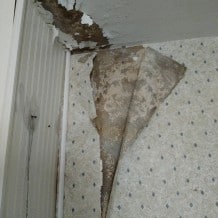How Mold Gets There

Mold is an necessary part of our ecosystem. It aids the decomposition of many organic substances necessary to plant, animal and human life. Molds multiply by producing spores which then circulate in the air. When the spore finds a moist surface it sticks to it and begins to grow into mold. Indoors, those airborne mold spores can cause serious health problems for people.
Image: Mold can hide in your home.
Mold spores can enter a household through open doorways, windows, heating systems, ventilation and air conditioning units. They attach themselves to your clothing and can even be brought in by pets. When they find the right conditions they grow and contaminate the air in your home.
Mold requires just two things for life and growth: there must be a source of water and a surface to which it can cling. Mold can be found just about anywhere, but indoors it is most often found on or around plumbing fixtures like sinks, tubs, toilets, showers, air-conditioning systems and water-heaters.
Many common building materials such as drywall, wood, carpets, and carpet padding are suitable surfaces for mold growth, and mold is often found near points where water can collect, such as roof leaks, improperly sealed windows, foundation slab cracks, unsealed concrete foundations, cracks in siding and plumbing leaks. Beyond leaks and floods, with normal life moisture collects in our homes from showering and cooking, damp basement floors, even just from breathing.
Many experts agree that mold at least in some form is pretty much everywhere, but it is never healthy to live with mold. Current thinking is that mold-related health problems are related not only to the amount and types of mold but also the length of mold exposure.
If you have a moist basement, then you know you have mold. If you smell a moldy odor, then you know you have mold! The odor of mold indicates there are thousands of live mold spores floating in the air. These spores may be breathed in and cause illness, or aggravate pre-existing respiratory conditions.
No matter what type of mold you have, it is unhealthy and you need to get rid of it. The next page will help you find it.
Mold is an necessary part of our ecosystem. It aids the decomposition of many organic substances necessary to plant, animal and human life. Molds multiply by producing spores which then circulate in the air. When the spore finds a moist surface it sticks to it and begins to grow into mold. Indoors, those airborne mold spores can cause serious health problems for people.
Mold spores can enter a household through open doorways, windows, heating systems, ventilation and air conditioning units. They attach themselves to your clothing and can even be brought in by pets. When they find the right conditions they grow and contaminate the air in your home.
Mold requires just two things for life and growth: there must be a source of water and a surface to which it can cling. Mold can be found just about anywhere, but indoors it is most often found on or around plumbing fixtures like sinks, tubs, toilets, showers, air-conditioning systems and water-heaters.
Many common building materials such as drywall, wood, carpets, and carpet padding are suitable surfaces for mold growth, and mold is often found near points where water can collect, such as roof leaks, improperly sealed windows, foundation slab cracks, unsealed concrete foundations, cracks in siding and plumbing leaks. Beyond leaks and floods, with normal life moisture collects in our homes from showering and cooking, damp basement floors, even just from breathing.
Many experts agree that mold at least in some form is pretty much everywhere, but it is never healthy to live with mold. Current thinking is that mold-related health problems are related not only to the amount and types of mold but also the length of mold exposure.
If you have a moist basement, then you know you have mold. If you smell a moldy odor, then you know you have mold! The odor of mold indicates there are thousands of live mold spores floating in the air. These spores may be breathed in and cause illness, or aggravate pre-existing respiratory conditions.
No matter what type of mold you have, it is unhealthy and you need to get rid of it. The next page will help you find it.
Next : Types of Mold and the Harm They Cause






